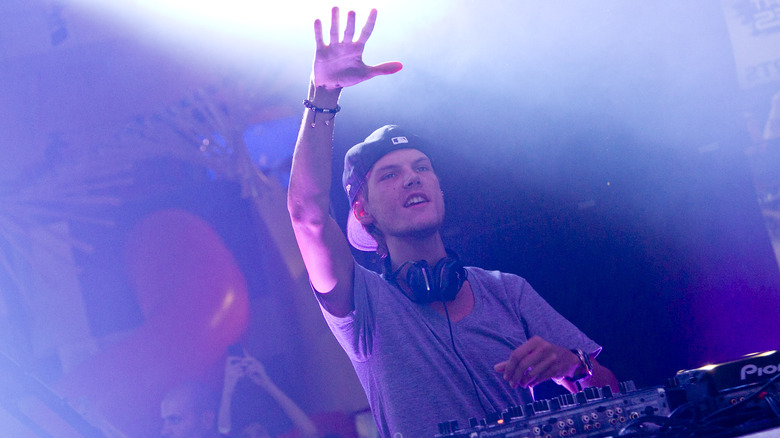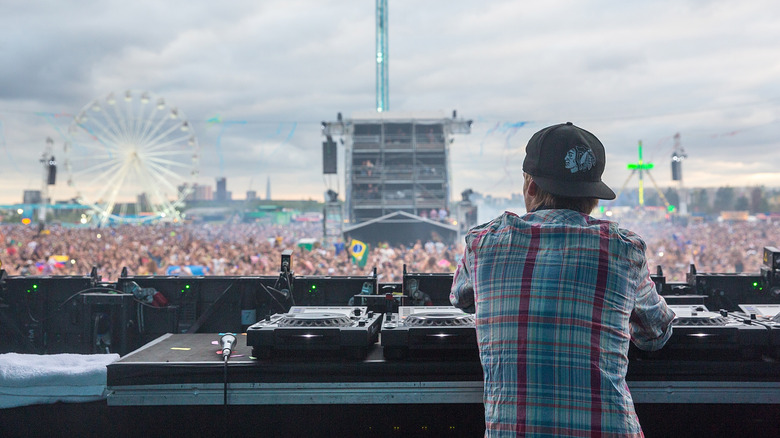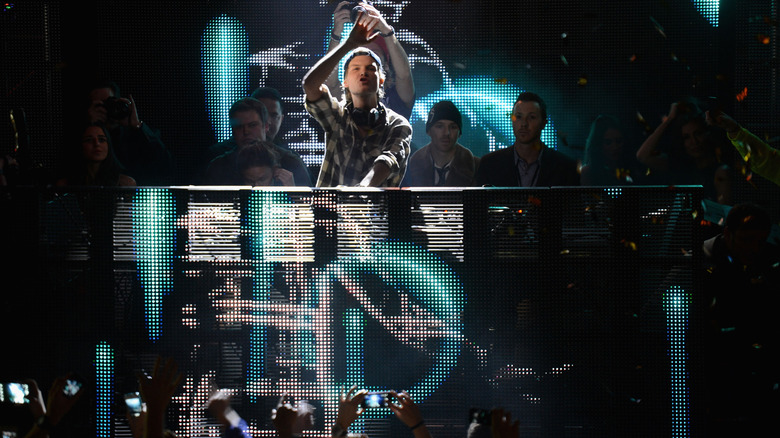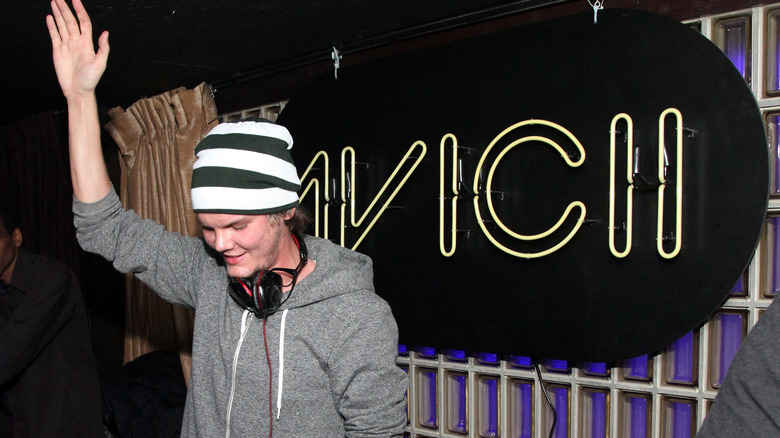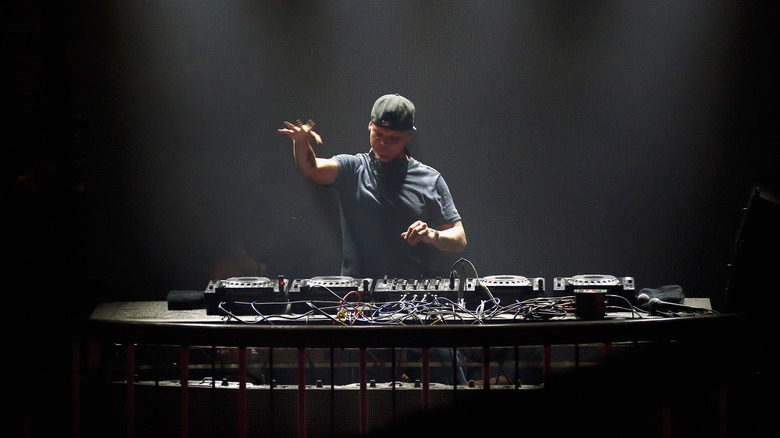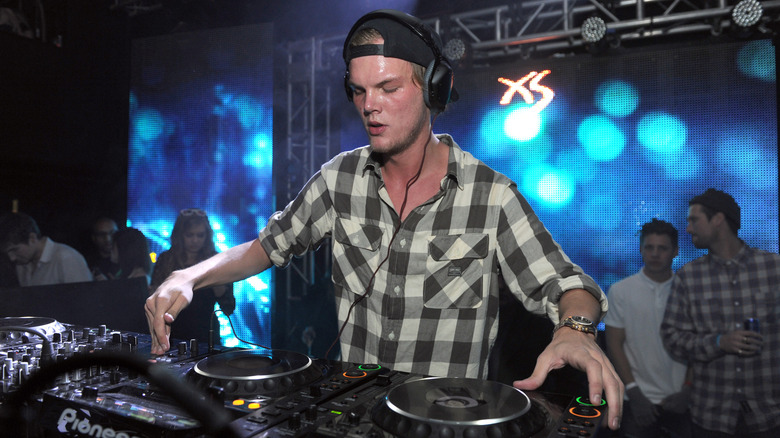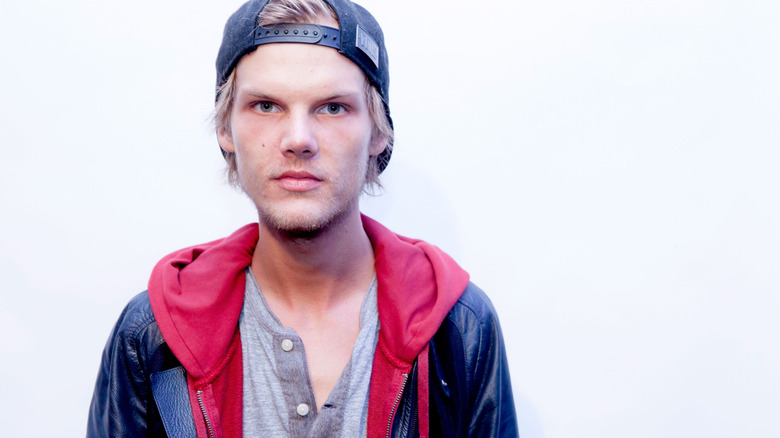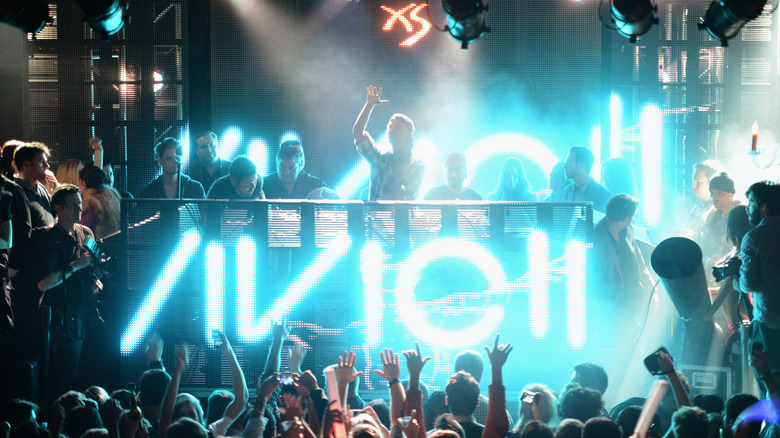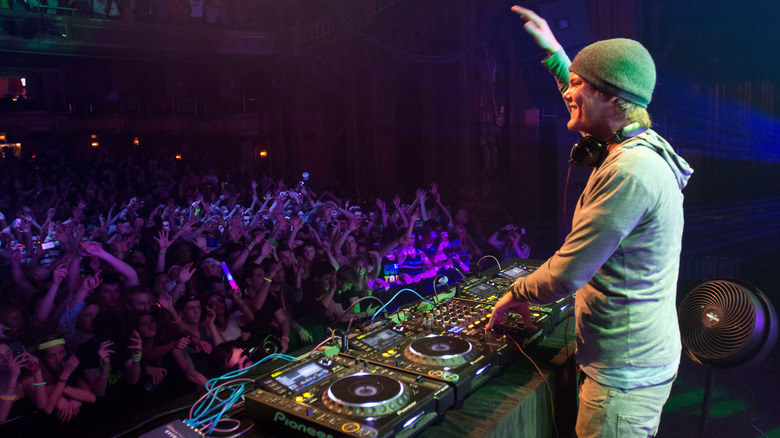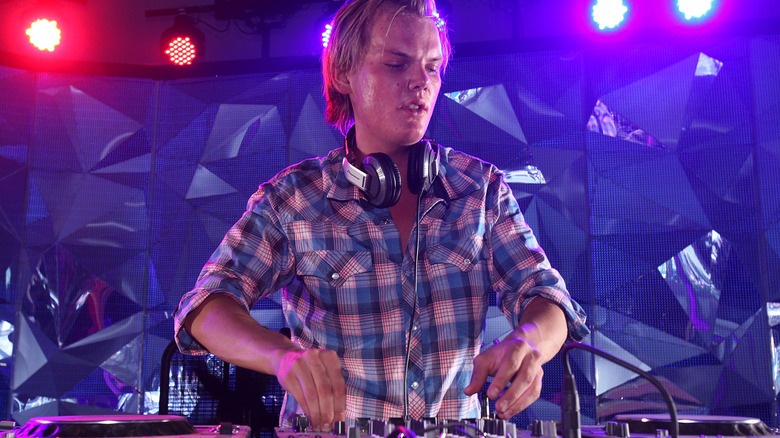The Tragic Real Life Story Of Avicii
When Tim Bergling was discovered in 2008, it was impossible to predict the meteoric trajectory his career was going to take, catapulting him into the upper reaches of the music industry. A global superstar of the EDM world for just a few short years, his story proved tragically true to the old saying by Chinese philosopher Lao Tzu: "The flame that burns twice as bright burns half as long."
Bergling — better known to the world as Avicii — died by suicide when he was just 28 years old. While it shocked the public, those who knew him privately knew that he had been struggling with the weight and pressure of fame for a long time. After his death, People spoke with his longtime mentor, Laidback Luke. "He was totally thrown into this. All he wanted was to make beautiful music. 2015 was the last time I saw him face to face, and I remember there wasn't much Tim left. Tim looked to me kind of like a zombie. He had aged significantly. When I saw him perform, it was as if he wasn't in touch with life anymore."
That's a chilling assessment, and it's a painful reminder: Having fame and fortune isn't as easy as it looks from the outside, and no amount of money can remove some of humanity's most basic feelings, including stress, anxiety, depression, and fear. Avicii's story is a tragic, cautionary tale, and it's one that those who loved him hope doesn't get forgotten.
This article deals with topics including addiction, mental health, and suicide.
He had depression and self-esteem issues
Tim Bergling was just 21 years old when he shot to fame as Avicii, a name famously inspired by Buddhism's hell — and because his real name was taken on Myspace. While most 21-year-olds might think they've got a handle on this thing called life, that wasn't the case for him, and Bergling's father has been candid about his son's mental health struggles.
Klas Bergling appeared on "CBS This Morning" in 2019, the year after his son died by suicide. In an incredibly honest interview, Klas noted that his son had always dealt with anxiety and lauded him for his honesty in talking about it. By the time he was around 14 years old, his parents had sought professional help for him: "When you have a child that's not feeling well, you try everything to get the situation right again," Klas explained. "You try to understand what's going on." The family got help from a psychiatrist, and at the time, it helped immensely.
Journal entries (via The Daily Beast) reveal the depths of his anxieties: As a teen, anxiety ran so deeply that he worried that he was developing cancerous tumors, and grew so fixated on physical insecurities that he would withdraw from the outside world. Once Avicii became a household name, those anxieties came into even sharper focus: He once experienced a panic attack when recognized by a crowd at a movie screening.
He turned to alcohol as a way of coping with anxiety
Even the best public speaker might balk at getting on stage in front of the kind of crowds that Avicii drew, and it turns out that the man behind the persona — Tim Bergling — had trouble, too. In clips from "Avicii: True Stories" (via BBC Three), he talked about how it got harder and harder to get on stage, and how he turned to alcohol to cope. "In the beginning, I was too afraid to drink, because I didn't want to screw up," he shared. "But then I realized how stiff I was when I wasn't drinking."
When Time spoke with him in 2013, he wasn't just at the top of his game — he had also started to see the consequences of his lifestyle. He revealed that he'd had a reality check when, at 21 years old, he developed pancreatitis; an incredibly painful condition where the pancreas becomes inflamed. It is most common in men between 45 and 54 years old — and is often associated with alcohol use.
Worries about drinking plagued him his entire life, and his tragic fate put old forum posts he'd written in perspective. He wrote (via The Daily Beast), "I'm worried about losing control of myself when I'm tipsy. Have never had these kinds of problems before but I'm worried that my anxiety will increase when I get drunk and I'll feel like nothing matters and take my life or something."
Stress, pressure, and alcohol resulted in severe medical problems
Behind the persona, Tim Bergling faced something terrifying when he headed to Australia, where he was struck by debilitating stomach pains. He spoke about the incident in clips compiled into the documentary "Avicii: True Stories" (via BBC Three) and explained that he'd been forced to cancel a few shows. Doctors warned him against performing, saying that pain medication could help ... but rest would help more.
Some of Bergling's journal entries were later revealed in "Tim: The Official Biography of Avicii," and those included (via the New York Post) ones where he admitted to not taking the advice of most medical professionals he consulted. Instead, he wrote: "I listened to the couple who said it was OK if I was careful." He continued to share some heartbreaking insight into his life: "Those days in the hospital were the most anxiety and stress-free days I can remember the past six years, those were my true vacations, as depressing as it might sound."
Health issues continued. Bergling would continue to suffer from pancreatitis, and would eventually have to have his gallbladder removed, as well as suffer a burst appendix. Those health struggles were compounded by the medication he took to manage acne outbreaks, which added to his self-esteem issues. His biographer noted that he frequently took Tetralysal, of which one of the side effects is inflammation of the pancreas.
Prescription painkillers turned into addiction
Levan Tsikurishvili is the filmmaker behind "Avicii: True Stories," and in 2018, he spoke with The Guardian about the documentary and how interpretation of events had changed after Tim Bergling's death. Tsikurishvili said that not only was Bergling the center of his documentary, but he became a good friend — and the director saw his struggles, up close and personal. That, he said, included opioid addiction that began when doctors started overprescribing things like Percocet.
Other close friends spoke of their realization that he was growing more and more dependent on prescription painkillers, and in "Tim: The Official Biography of Avicii" (via Billboard), Jesse Waits gives his perspective on it. Waits knew what addiction looked like — his father transitioned from painkillers to heroin — and the memoir recounts, "Jesse had, since then, learned to read the small signs, the changes in the face. That shiftless and absent-minded look, the satisfied and blank expression. Tim seemed to have slipped away in a similar way; if the restaurant had caught fire it would not have bothered him."
The pain medication was in addition to medication for anxiety and depression, and it led to several trips to the hospital for an emergency stomach pump. By 2015, those closest to him were worried enough that they staged an intervention, and although he did agree to go into a rehab facility, it wasn't the end of his tragic story.
He spoke about mental health issues before his death
After Tim Bergling's death in 2018, his parents founded the Tim Bergling Foundation in his honor. One of the goals of the foundation was to help remove the stigma attached to mental health issues and normalize conversations about mental health, and in later retrospectives of Avicii's career, it became clear that he had not only been upfront about how much he was struggling, but how much stress, anxiety, and pressure he was feeling.
In one clip included in the documentary "Avicii: True Stories," Bergling is sitting at a table while his team goes over the schedule of shows he has booked. He looks down, pained, and says (via BBC Three), "This is giving me anxiety. For real." He's ignored by those sitting around him, the merciless resuscitation of schedule continues, and he interrupts to try again: "It's giving me anxiety. I won't be able to do it. No way."
Throughout the film, there are glimpses of Bergling's struggles to keep his head above water. At other times, he's incredibly straightforward about the toll that his grueling schedule was taking, even saying (via The New York Times): "My life is all about stress. It will kill me."
He knew he wasn't getting the support that he needed
When Tim Bergling reached out to his parents, they got him the help that he needed to deal with chronic anxiety and depression. When Avicii reached out to those around him and asked for the same help, he felt largely ignored. He said as much in "Avicii: True Stories," and explained (via BBC Three), "I was expecting support in stopping. Especially with what I'd been through. ... I didn't expect people to try to push me to do more shows when they'd seen how s****y I felt."
In 2018 — after Bergling's death — GQ took a closer look at those who had known Avicii best. One anonymous source was quoted as saying they'd tried to talk to him: "I kept telling Tim that he was putting food on everyone else's table, [while] he was falling apart." While some of his friends recalled being grateful to hear that he was trying to cut back on his workload, they also noted that some in his inner circle were apparently unsupportive.
They spoke with the Dutch DJ Tijs Michiel Verwest, who recalled Bergling looking better than he had in a long time, once he took a step back. But he also acknowledged that he didn't think it had been easy for him: "He had absolutely no protection. There was nobody taking care of him. Somebody needed to be there looking after his health and he didn't have that and he wasn't yet strong enough himself."
He felt helpless, exhausted, and constantly on the verge of collapse
In a 2011 letter written to his manager and quoted by The Daily Beast, Tim Bergling wrote, "It feels like I'm going to faint every single day now. And not just today and this tour but from about the first time I mentioned that I felt worn-out ... pretty regularly but I push it back down and chose not to bring it up because there's nothing I can do about it."
To say that Avicii was in high demand is something of an understatement. In 2012, he performed more than 200 shows, and Avicii himself suggested to People that he actually averaged somewhere around 300 shows a year.
That would take a toll on anyone, but in 2016, The Guardian took an in-depth look at the unique and specific challenges faced by EDM musicians. In addition to the sheer number of shows, there's also the fact that they're on stage throughout the night, often have trouble falling asleep after the high-energy performances, and end up caught in a vicious cycle of sleep deprivation. That lifestyle can contribute to problems like a weakened immune system, problems with memory, thought processes, and mood regulation, and even high blood pressure and an increased risk for heart disease. Avicii wasn't alone in what he was feeling, as Moby explained, "You can only tell yourself so many times that you're happy and grateful before the brain interrupts and says: 'Oh, by the way, we're miserable. We're lonely and isolated and anxious and depressed.'"
That Saturday Night Live parody hit hard and opened a wound
Shows like "Saturday Night Live" make their bread and butter by ridiculing people, and it's not always a bit of harmless fun. In 2014, Andy Samberg did a sketch lambasting EDM musicians, and his character — DJ Davvincii — was a pretty obvious reference to Avicii. Tim Bergling was deeply hurt by it.
The incident is mentioned in "Tim: The Official Biography of Avicii" (via Billboard), and even though Bergling acknowledged the sketch with a seemingly benign Instagram post, it had opened an old, deep wound. Avicii was performing for countless people, sacrificing his own health to be on-stage, and keeping himself to a grueling schedule, yet there was that oft-repeated accusation that he really wasn't doing anything at all.
Bergling wanted to be seen not as a button-pusher, but as a composer and a dedicated student of musical composition. Being written off was an incredibly hard pill to swallow, and it was one that he faced often. In a 2013 piece for GQ, he was quoted as saying, "Yeah, it's mostly volume. Or the faders, when you're starting to mix into another song." He took to Twitter to condemn the interview as being vastly misleading, incorrect, and said that he was misquoted. It wasn't the only time he took to social media to defend his work, at one point saying, "... even though I could beat mix in my sleep doesn't allude any kind of respect which I find deeply insulting."
He was mocked for stepping away from touring
When Avicii announced that he was going to be retiring in 2016, it wasn't an abrupt end to his live shows. In fact, he made the announcement when he still had a handful of shows left on his then-current — and final — tour. When he spoke with The Hollywood Reporter about it, he was honest about how difficult it had been — but not because it was going to be difficult to step away from the stage, saying, "I was nervous when I made the announcement, mainly that I would look ungrateful. But I've gotten so many supportive texts from friends in the industry, other DJs, other artists."
That's not to say that he didn't get some pushback, and it was loud enough that it prompted some of his colleagues to step forward and condemn the haters. When Vice wrote a scathing article ridiculing him for the decision, Moby spoke up to The Guardian and said, "No one should ever be criticized for taking legitimate steps for self-care. I am simply not willing to sacrifice health and well-being because ultimately, that's all we have."
Did Avicii see the criticism? Absolutely, and according to documentary filmmaker Levan Tsikurishvili, a sense of responsibility to his team kept him going way longer than he wanted to go, and when cameras caught manager Ash Pournouri complaining about his perceived lack of business sense, he simply said (via The Guardian), "That really hurt."
He died by suicide at a tragically young age
Tim Bergling — aka Avicii — died by suicide in 2018. Days passed after his death with no real details being announced, aside from the fact that he had been in Oman. When his family issued a statement on his passing, it was devastating. It read in part (via The Guardian), "Tim was not made for the business machine he found himself in; he was a sensitive guy who loved his fans but shunned the spotlight. ... The person you were and your music will keep your memory alive."
Bergling was just 28 years old when he died, and in 2021, his father, Klas Bergling, spoke with The Sunday Times (via the Independent). He revealed that friends had reached out to him and said they were concerned about his mental health, and he and his wife were preparing to fly to Oman to meet up with him when they received another phone call that he had died.
Since his passing, there's been plenty of speculation as to what happened, but it's just that: speculation. One of the most oft-repeated claims is that Bergling's management team pushed him way beyond his limits, but Klas didn't see it that way. Instead, he suggested that there were a multitude of factors, and that his son wasn't the only one at risk, saying, "It's fame and fortune, and that's a very dangerous combination. When you have an up-and-coming artist, there should be some structure."
His friends and family have been candid about the burdens his passing left
In 2019, The Guardian reported that Bergling's closest friends had been hard at work finishing some of the music he'd left unfinished, which would be released on a posthumous album with sales benefiting the Tim Bergling Foundation, the mental health charity founded by his parents. It was no small task, and they felt the gravity of their contributions.
Carl Falk explained: "When someone close to you passes, the emptiness becomes a mission. ... I had to make this as good as I possibly could to honor him and our friendship." That's a heavy burden to bear, but those involved said that it also brought them closure, as well as a closer relationship with Bergling's family, who controls his estate.
The project went ahead not only with their blessing but with their guiding hand, as it was Klas Bergling who approached musicians to ask them to be a part of it. When he spoke with "CBS This Morning" in 2019, he was candid about what Avicii's death had forced them to face. Klas said that they had gotten to the point where they could say what it had been — suicide — and that for a long time, they hadn't been able to use the word. "To pronounce is also to admit that you're a part of this destiny, so to say. ... It's a life before, and now, it's a life after. That's the best way you can express it."
If you or anyone you know needs help with addiction issues, mental health issues, or is in a crisis, contact the relevant resources below:
-
The Substance Abuse and Mental Health Services Administration website or contact SAMHSA's National Helpline at 1-800-662-HELP (4357).
-
The Crisis Text Line by texting HOME to 741741, call the National Alliance on Mental Illness helpline at 1-800-950-NAMI (6264), or visit the National Institute of Mental Health website.
-
Call or text 988 or chat 988lifeline.org
